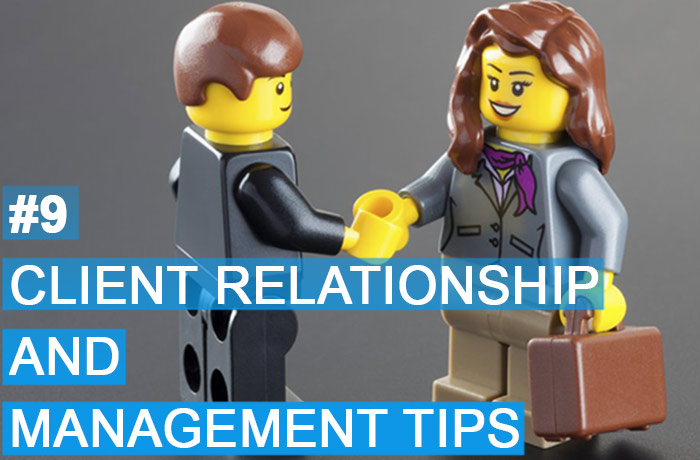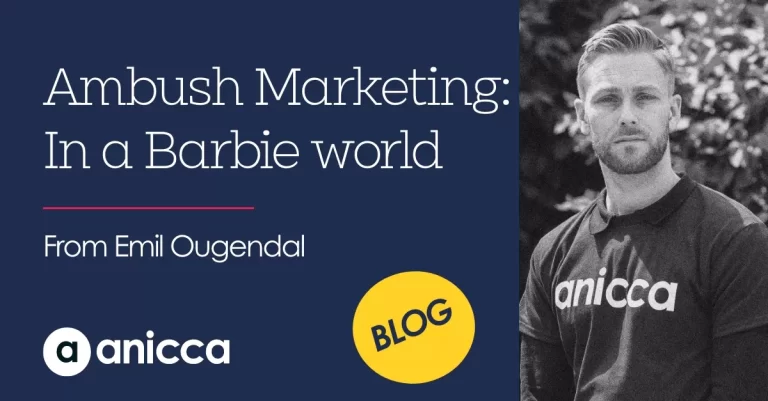9 Client Relationship and Management Tips for Digital Marketers
First of all, Happy 2019! I am sure that one of the main business targets on any marketing consultant or agency’s 2019 list is to grow your client base, grow your current campaigns, increase retention and overall…GROW your business. One of the main factors to that will help you facilitate this is successfully delivering client relationship and project management.
Having worked in the digital industry since 2006 I have been lucky enough to get some early exposure to client and project management. Fortunately, this allowed me to get a lot of obvious mistakes out of the way early on.
Since then I’ve had the pleasure of learning from an eclectic group of mentors, colleagues and clients. From starting as an in-house web designer to becoming an SEO consultant working at four agencies, I have been exposed to an array of projects with their own unique challenges and opportunities for success.
As a result of this experience so far I have learned a great deal about project management, client relationship management and communication, and I am at a point where I can confidently deliver successfully in these areas. By no means is the learning complete. Every day is a learning experience in these areas, but I thought I would list a few things that I know work well in delivering effective project and client management.
1. Learn Your Client’s Business and Industry

As a web designer, one of my first bosses stressed to me that although I am only creating a landing page for a client with a contact form, I should try to learn everything about this client’s services, infrastructure, website performance and competitors.
It sounds like overkill, however, this created an opportunity for me to suggest additional landing pages which would help drive more traffic for other services that they had poor visibility for compared to their competitors. So, the lesson I learned was that even if you are a small cog in the project it’s worth learning as much information as possible as you never know when it will prove valuable.
On the other end of the scale, if you are creating a marketing strategy for a client and you are managing multiple stakeholders, it is essential you learn everything about:
- Each stakeholder, their availability in the week, their role within the project and organisation and all of their contact details. You also want to gauge their personalities in relation to how receptive they will be to new ideas, new costs and pain points
- Any internal politics that may affect the progress of the campaign or new ideas (and budgets)
- The organisation’s structure and all services (even the ones outside of the campaign remit)
- The competition, segmented by service, target region and priority to the organisation
Build a document hub for your clients with all useful information categorised and easily accessible. Consider using Google Drive or similar shared document platform to share all of this with your colleagues and stakeholders.
2. Understand Their Business KPIs in Relation to Your Project

An example of a typical KPI from a client may be to increase sales of a particular product or service in a specified target region by a certain date. This guidance can easily be used to create digital KPIs for a marketing campaign, where you might say that “in order to affect this business target we need to drive more relevant and qualified traffic via XYZ tasks by month 12”. You can then set some realistic digital KPIs as a result of this scoping, such as targeting a 30% increase in organic traffic in order to generate £x more revenue by month 12, for example.
Challenge Clients on Soft KPIs
A client may suggest some softer KPIs they are adamant on, such as gaining position one rankings in Google for specific high competition keywords. As a consultant, you might not agree that this type of KPI should be the sole driver of a campaign. At this point, it’s important to ask yourself “will they consider the campaign a success if they reached this KPI at the end of the campaign?”. They might get that ranking position for a super competitive keyword, but it might not drive enough additional revenue and justify the costs and their time on this campaign.
Therefore, it’s important to speak up within the parameters of your relationship (and use any senior colleagues for this conversation if you feel this would be more appropriate). If you can have this dialogue there is an opportunity to investigate the thinking behind this and educate the client on what type of work and KPI will affect their bottom line directly.
In my experience, I have been able to discuss this with a client, showing examples or forecasts of how much their suggested soft KPI will actually help their bottom line versus a more robust KPI. A typical SEO example is showing how limiting one high ranking competitive keyword would be versus several lower competition targeting keywords, with forecast data on potential revenue increases.
Once you understand the business KPIs and not just the digital KPIs you can then propose additional work to help affect this and when you gain more trust and show results you might be in a position to contribute towards their new business KPIs.
3. Regular Communication and Reporting

In my experience, regular communication with a client is very beneficial for both parties. For the client, the reassurance that you are available via email and phone and can respond within a reasonable amount of time is one of the most cited positive feedback points from clients. For consultants, this regular communication allows you take the pulse of a client and campaign, allowing you to keep up to date on their status. The overall benefit to a consult is the opportunity to build a relationship with this regular communication and reporting.
Avoid Missing Any Client Pain Points
For the consultant, this regular communication is key in ensuring you are completing the right work and stay up to date with regards to the client’s satisfaction. Without this regular contact, even if you have clear tasks to complete, you could miss pain points that the client may not expressly inform you of in an email but may still be thinking about it.
At Anicca, we schedule regular calls, regardless of whether there is anything specific to discuss. We also schedule regular reporting and we respond to emails within 24 hours at the latest. We take communication very seriously.
Shout About Your Success!
With regards to reporting campaign performance, we feel its important to transparently report both good or bad performance with clear analysis and solutions provided where needed.
It’s important to be honest and constructive if things go bad. In my experience, the client will respect you and trust your word, particularly if you provide a solution to go with any bad news. On the other end of the scale, it’s very important to SHOUT about any successes, large or small. Clients love any bit of good news and this can greatly contribute to building trust and rapport with the client.
4. Build Rapport and Relationships

In my experience regularly communicating and becoming reliable for delivering high-standard work on time can take you a long way in building client relationships and rapport.
Personally, I like talking to people. And I like my job, so I make the most of it and where possible get to know people and build fruitful relationships, both in my organisation and with my clients.
I have found that going the extra mile makes a lot of difference. For example, remembering a client likes samosas and bringing them in for the next meeting, or going for a meal or drinks with a client. These things have helped me build on my client relationships and create more opportunities for open dialogue, where you can freely discuss things like campaign performance and opportunities for future work.
Take Advantage of Networking Opportunities
I have found it beneficial to attend literally anything I have been invited to by clients. This has included company marketing meetings where you are required to present a topic, or meals, drinks or attending marketing seminars together. During these outings, I have been fortunate to meet other people within a client’s organisation who have heard about our campaign’s successes and want to replicate this in their department too. So new business is also a possibility.
5. Be Proactive

This sounds quite broad and somewhat obvious but you can forget to be proactive, particularly if you are doing repetitive tasks within a constrained timeframe. I have been guilty of this too.
Being proactive to me means regularly taking a step back, checking that you are affecting the core KPIs of a project and trying to think outside of the parameters of your campaign. If you are responsible for SEO, for example, and see an opportunity to use some budget for paid ads for seasonal campaigns, why not discuss this with your colleagues. Get a rough plan together and approach the client with clear benefits to their KPIs.
Another example could be referring back to the client’s business KPIs (not your digital KPIs) and thinking of additional services or activities that could help drive more revenue to other areas of the business that were not originally scoped for your campaign.
I have personally seen proactive behaviour pay-off by:
- Helping to build more trust and rapport with a client
- Helping the client decide whether to renew or grow a campaign
- Gaining reviews and testimonials for your agency
- Generally setting yourself and your agency apart from your competitors
6. Be Honest and Transparent

The fact that I have mentioned this in earlier points means it’s quite important. This ethos has been an essential part of my career and it is something Anicca Digital has advocated religiously since day one.
At Anicca this starts at the sales process. We will be very honest and clear about what we believe will work and what we think won’t. We will not suggest work that we think won’t ultimately benefit a company’s bottom line. An example might be that a client thinks they need SEO and have a certain amount of budget to achieve a KPI within a tight timeframe. If it turns out that they are quite strong on SEO currently and want to affect KPIs in a short space of time we may suggest PPC to start with. We may even suggest training in-house staff if budgets are really tight and offer a phased approach, rather than proposing a large project or nothing at all.
This extends to the project management of campaign and client communication. My colleagues and I are transparent when reporting on a campaign’s performance, shouting about success and constructively reporting on any negative performance.
In my experience, this honesty creates trust, which is invaluable. If I was to relate to how valuable a client finds this kind of transparency, I’d relate it to finding a capable and honest mechanic, who WILL tell me if I actually need a new part or not! As a result, I will keep using them for years.
7. Have a Detailed Contract To Refer To

You may be in a position where you are asked to complete work outside of the remit of your contract, or that you cannot hit a deadline because a client may be slow to respond with information. Having a detailed contract with an agreed remit and deadlines for deliverables, both ways, is key if this kind of issues gets to that point.
It’s also important to list your KPIs and be realistic when listing these. This is a contract at the end of the day so both parties can be held accountable for not fulfilling any agreements.
It’s beneficial to also list agreements such as reporting and communication frequency, deadlines for deliverables – both ways, any break clauses, a schedule of tasks (with room for unforeseen schedule changes or a caveat for these), third party costings and so on.
A reasonably detailed contract that both parties have agreed to is an essential tool for all team members to refer to and work-off, and for a client to refer to on their end to hold Agencies accountable.
8. Attention to Detail (Proof Read Your Work)

As I write this blog I am checking my grammar and spelling on the fly and will be checking it again before I submit it to my colleague for proofing. However, I know one of my weak points is writing, so I will be asking a colleague to proof this.
Attention to detail sounds like another obvious point but it can get lost in the mix when you have deliverables and tight deadlines. I make it a point to check every detail of every piece of work I send out, whether it’s for the writing or the accuracy of data and my resulting conclusions. My colleagues are also a great resource in helping to achieve this high standard through proofing and general feedback.
The benefits of this within a campaign and client relationships are trust and advocacy of your work and your agency. If you don’t work for yourself it’s important to remember that you are representing the whole organisation that you work for with every communication and every piece of work you deliver.
9. Conclusion: Take Pride and Ownership of Your Project

This is the career I chose, so regardless of whether I get a good or OK project I am all in. I find that if I take complete ownership of the project and set some personal goals for the project (aside from the KPIs) I can grow to really enjoy the project and become completely invested.
If a project is particularly difficult, whether it’s working through restrictions or learning something new, I will try to find the joy in the experience.
By adopting this way of thinking I have been able to deal with low or difficult periods by saying to myself “how will this experience benefit me in the future?” As a result, I have applied new skills I have had to learn for a project and increase my efficiency and value as a consultant. I have learnt new ways in which to deal with different personalities and situations and this has helped me in my personal life as well as work.
I have also found that when clients see your joy and enthusiasm in the project it can reassure them of your commitment and even motivate them in seeing the campaign or task through.



